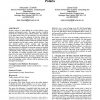Free Online Productivity Tools
i2Speak
i2Symbol
i2OCR
iTex2Img
iWeb2Print
iWeb2Shot
i2Type
iPdf2Split
iPdf2Merge
i2Bopomofo
i2Arabic
i2Style
i2Image
i2PDF
iLatex2Rtf
Sci2ools
115
click to vote
SOUPS
2006
ACM
2006
ACM
Aligning usability and security: a usability study of Polaris
Security software is often difficult to use thus leading to poor adoption and degraded security. This paper describes a usability study that was conducted on the software ‘Polaris’. This software is an alpha release that uses the Principle of Least Authority (POLA) to deny viruses the authority to edit files. Polaris was designed to align security with usability. The study showed that despite this aim, usability problems remained, especially when the study participants had to make security related decisions. They also showed apathy towards security, and knowingly compromised their security to get work done faster. This study also demonstrates the difficulty in achieving security and usability alignment when the usability is a post hoc consideration added to a developed product, rather than being integrated from the start. The alleviation of usability problems from security software proposed in this paper are threefold: reducing the burden on the user to make security related decis...
Related Content
| Added | 14 Jun 2010 |
| Updated | 14 Jun 2010 |
| Type | Conference |
| Year | 2006 |
| Where | SOUPS |
| Authors | Alexander J. DeWitt, Jasna Kuljis |
Comments (0)

